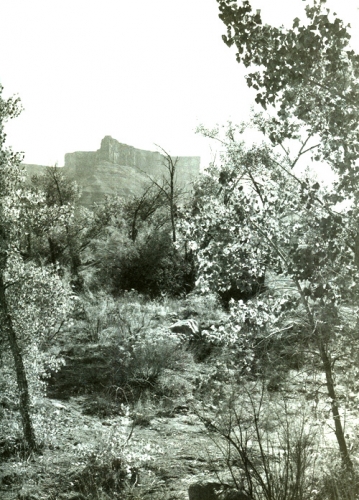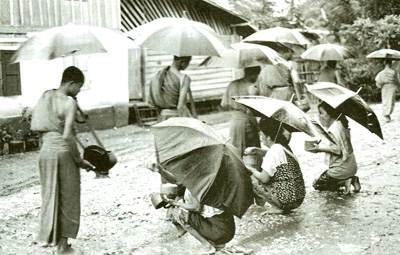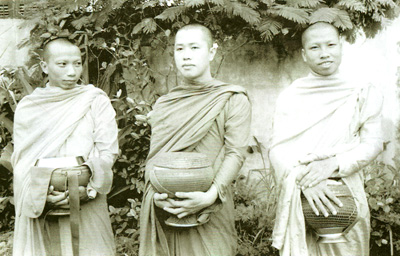
Dawn. I’m sitting at the edge of a mesa in southern Utah. Above me is a vast, pale expanse of sky; below me, the town of Rockville; and beyond it rise the rose—and salmon—colored cliffs of Zion National Park.
If this were Thailand, I could go down into Rockville for alms. Then I’d be free to wander the mesas—meditating under rock ledges by day and on top of them by night—for weeks on end. As it is, the friend who drove me here will soon be fixing our meal, and in only a few days we’ll have to retUrn to our responsibilities in California: his to his family, mine to my monastery.
The life of a monk in America is far less free than it can be in Thailand. Having trained there for fourteen years, I feel the difference in my bones. There you can roam for months at a time, fairly assured that someone will put food inyour bowl when you go for alms in the morning. Most monks, of course, prefer to trade the dangers and uncertainties of forest wandering for the security of life in a village or town monastery, bui: the wandering ideal has always been there in the background, not simply as an abstraction, but as a living option.
For centuries, meditating monks have been roaming the wilderness of Southeast Asia, living in symbiosis with the subsistence farmers scattered through the jungle. The monks’ rules require that they live entirely outside of the market economy, avoiding any activities that would separate them from a pure wilderness life; farming, herding animals, engaging in trade, or storing food. In a sense, they are hunters and gatherers, although-because they can’t kill animals, pluck from plants, or dig up the soil-they hunt and gather with a difference: they forage daily from the generosity of the farmers. To compensate for the burden they place on their supporters, they have to make themselves worthy of that generosity by living frugally and virtuously, keeping their needs to an absolute minimum.

Both sides benefit from the relationship. The monks are free to spend their days in meditation in an environment that continually puts their mindfulness, patience, and endurance to the test. Faced with the physical ane mental dangers of wilderness living, they find that the dharma provides their refuge, their prime means of survival. This gives them an appreciation and practical understanding of the dharma that cannot be learned from books. Their lay supporters benefit from having, within short walking distance, experienced specialists who have dedicated their whole lives to the dharma and are happy to share their wisdom and experience.
Because wilderness monks rarely leave a paper or an inscribed-stone trail, they’re almost never mentioned in the standard histories of Asian Buddhism. But if you look carefully at those histories, you’ll find that wilderness monks have played an important role in keeping the dharma alive. In periods of crisis when people in the centers of power have lost faith in the way Buddhism has been domesticated in the cities, they have turned to the wilderness monks to spearhead reforms. In this way, these monks have provided a counterweight to the values and economic forces that tend to subvert the dharma to lesser ends.
It would be good if a wilderness Buddhism were to take root here in America as well. Like every other wilderness movement in our country, it would have to lie outside the mainstream, but that would be the whole point. It would always be there in the background to keep American Buddhism grounded, providing an alternative (and sometimes a corrective) to the market forces that are mainstreaming the culture of awakening.

At the same time, a roaming sangha of trained monastic dharma-seekers would add some needed rigor and depth to our homegrown American tradition of wilderness wisdom. For all their insights, our Black Elks, Thoreaus, and Muirs offer no satisfactory analyses of aging, illness, and death, and no recommendations for how to go beyond them. Think of how much richer our nation would be if our woods harbored people of recognizable spiritual attainment and genuine insight who offered definitive answers to these issues, and who were at the same time on good terms with the people in the towns. People disenchanted with the market economy would have someone to turn to, and wouldn’t have to reinvent the dharma wheel every time they took to the wilds to live an authentic life. They’d have access to a dharma and discipline with a proven track record over the past two and a half millennia for taking people beyond birth and death. They’d also be able to depend on an alms economy that would free them to pursue that dharma and discipline on a full-time basis.
Those who remained in the market economy would be able to tap into whatever wisdom their dropout friends had gained from their wilderness experience—wisdom that our current society simply throws away. If people in and out of the market economy could develop a rapport like this, our society as a whole might develop a healthier respect for the wilderness and for the need to keep it wild. As more wisdom came from the wilderness, our nation as a whole would become more civilized.
What would it take for this soq of rapport to take root? A critical mass of two sorts of people: good monastics and laypeople living on the fringes of the wilderness who have come to recognize and value good monastics. How long would it take to develop this critical mass? Certainly more than ten years. Ten decades might not be enough. Good monastics can’t be rurned out with a cookie cutter. Each one takes lots of personal time and energy to train. And as for the trust that forms the bedrock for the lay-monastic relationship, that won’t become solid until the integrity of Western monastics has been tested over time.
At present, North America has only seven small monasteries in the Thai Forest Tradition, each a hothouse plant existing in a small bubble of lay support. Monks occasionally make forays outside the bubbles, discovering sympathetic pockets of potential support in different parts of the country, but the whole enterprise still feels tenuous and uncertain. I for one can’t foresee when or where our cultural climate will change to the point where the hothouse is no longer required.
But then, the unforeseeable has a way of happening. When I left the States for Thailand in 1976, I had no way of anticipating the warm response I’ve encountered as a monk since my return here ten years ago. One thing is certain, though: as hunters and gatherers, we have to regard everything that comes our way as a gift, so long-term planning is a futile exercise. All we can do is make ourselves worthy of gifts—which means that the first order of business is right at the breath, here and now.